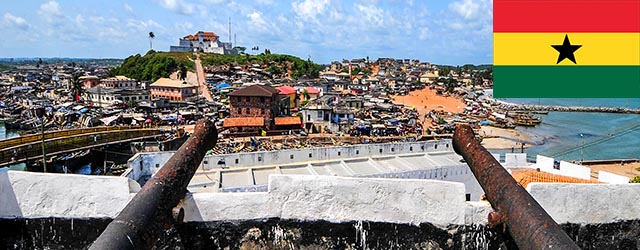With oil revenues plunging, Ghana seeks to boost the inflow of foreign direct investment.

Historically, Ghana has had a reputation as one of West Africa’s most stable countries. But recently its situation started to deteriorate for a combination of reasons. Now foreign direct investment (FDI) is one key way the nation can recapture its edge.
A decade ago, Ghana was known for an expanding economy and falling poverty, an outlook further brightened by the discovery of offshore oil in 2007. Revenues from these deposits started flowing in 2010. But the economy began a backslide, hit by rising debt, overly optimistic revenue projections and increased spending. The International Monetary Fund (IMF) estimated that Ghana’s debt accounted for 72% of GDP in 2015.
Low oil prices hurt. In January, the World Bank lowered its crude oil forecast to $37 per barrel, down sharply from its October forecast of $51 per barrel, citing earlier-than-anticipated resumption of oil exports by Iran, increased efficiency in American production and reduced consumption by emerging markets. The Bank projected continued low commodity prices, a blow for Ghana’s exports.
All that, plus a depreciating currency, shifted the country’s outlook, according to Melissa Cook, founder and managing director of African Sunrise Partners and a member of President Obama’s Advisory Council on Doing Business in Africa.
Ghana has “had currency problems, budget problems and a failure to really capture the promise,” she says. A disputed presidential election in December 2012 won by president John Mahama but followed by a court case launched by the opposition—the case lasted until August 2013—slowed development. So did successive power shortages.
As an immediate solution, the IMF in January approved $114.6 million in funds for Ghana as part of a three-year arrangement announced in April 2015 that provided for a total of $918 million. The IMF’s goal is to restore macroeconomic stability and return Ghana to high growth.
Longer term, FDI might provide another solution for the country, with opportunities to invest in power infrastructure, agribusiness, communications, technology and financial services.
Consumer goods have already become highly competitive under multinationals like Nestlé and Unilever.
Ghana’s openness to FDI, its relatively stable government and small size make it a good starting point for a multinational with little experience in Africa. “If you are looking to go into a country where it is your first oar in Africa … it’s an easy place to do business in,” Cook says.
Of course, it depends on the kind of business you’re in. Frequent power shortages are one the challenges confronting companies setting up operations. The US State Department warns of piracy of intellectual property, despite a series of six copyright laws passed since 2003. Computer software shows up in street markets and counterfeit pharmaceuticals turn up in public hospitals. Pirated items also include epoxy, cosmetics and household cleaning products. Copyright infringement lawsuits move slowly.
Corruption, while less prevalent in Ghana than elsewhere in the region, is still cited by some companies as an obstacle to FDI. Government officials have been accused of corruption. Authorities suspended seven high court judges in October 2015. In December, 20 lower court judges implicated in a bribery scandal were sacked.
Setting up business is complex and requires compliance with regulations of at least five government agencies.
Ghana can only hope that investment will flow despite the challenges and help the country get its edge back.
Vital Statistics |
|---|
|
Location: West Africa |
|
Neighbors: Burkina Faso, Togo, Côte D’Ivoire |
|
Capital city: Accra |
|
Population (2014): 26,786,598 |
|
Official language: English |
|
GDP per capita (2014): $1,441.60 |
|
GDP growth (2014): 4% |
|
Inflation (2014): 15.5% |
|
Currency: Cedi |
|
Investment promotion agency: Ghana Investment Promotion Centre |
|
Investment incentives available? Vary by region |
|
Ease of Doing Business rank (2015): 70 |
|
Corruption Perceptions Index rank (2015): 56 |
|
Political risk: Stable government but impact of next election on FDI climate unclear; the approaching election cycle may slow governmental decision-making. |
|
Security risk: Border dispute with Cote D’Ivoire; at time of writing, no spillover of terrorism from Burkina Faso. |
PROS |
|---|
|
Positive government attitude towards FDI. |
|
Small, easily traveled. |
|
Recent IMF funding will bring some stability. |
|
Government has the discretion to apply additional concessions over and above those provided by law. |
CONS |
|---|
|
Minimum capital requirement for a foreign-owned enterprise is $500,000, or $200,000 if the foreign-owned company is working with a local joint venture partner. |
|
Inflation expected to continue increasing. |
|
Slow growth in China and elsewhere has reduced demand for commodities. |
|
No formalized privatization program. |
Sources: African Sunrise Insight Report, July 2015, Ghana Web; International Journal of Academic Research in Business and Social Sciences, PricewaterhouseCoopers; International Monetary Fund; US State Department; Transparency International; World Bank
For more information on Ghana, check out our Country Economic Reports at: GFMag.com/gdp-data-country-reports.html



